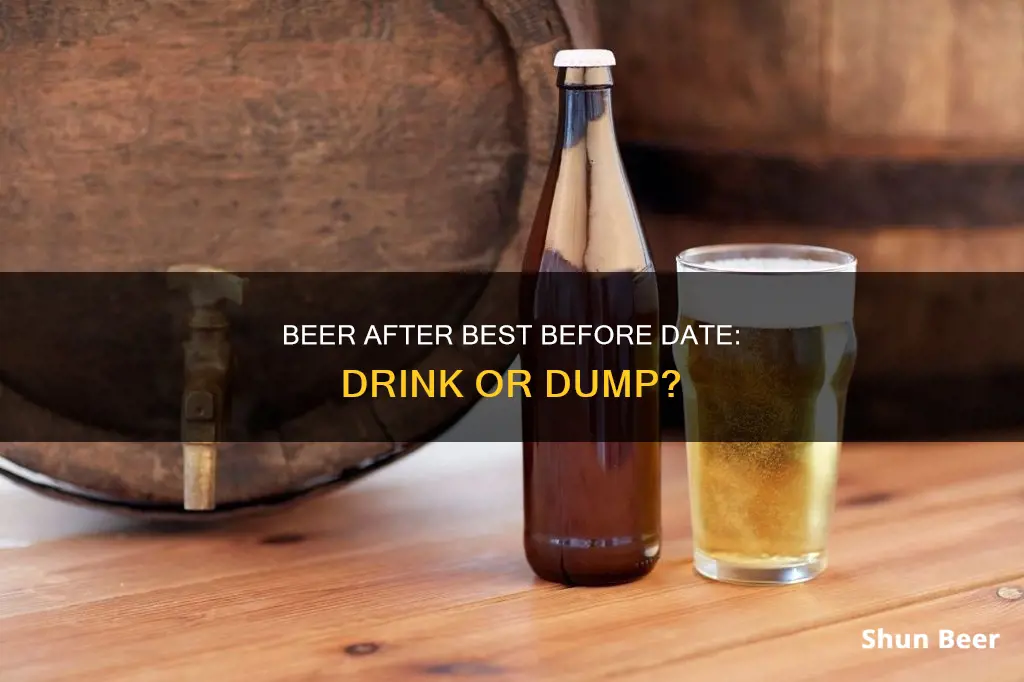
It's happened to the best of us. You find a long-forgotten can of beer at the back of the fridge or a dusty bottle tucked away in a cupboard. But is it safe to drink?
The good news is that, in most cases, drinking beer that's past its best before date is perfectly safe. Unlike use by dates on fresh foods, which are a rule rather than a guideline, best before dates indicate that the product will start to lose quality after a certain point. Beer is unlikely to make you sick, even if consumed years after it was brewed—but it might start to taste bad.
| Characteristics | Values |
|---|---|
| Is it safe to drink beer past its "best before" date? | In almost all cases, yes. |
| Will it taste good? | Probably not. |
| How long does beer last for? | It depends on the type of beer and how it is stored. |
| What happens to the beer past its "best before" date? | It will start to lose its quality and will likely have an unpleasant taste and aroma. |
| How to store beer to prevent it from going bad? | Store beer in a cool, dark place, away from temperature fluctuations and direct sunlight. Keep it upright to minimise oxidation. |
| How to tell if the beer has gone bad? | Bad aroma, missing the usual "pssst" sound and foaming at the top when opened, excessive sediment at the bottom of the bottle, etc. |
What You'll Learn

Beer's 'best before' date is a guideline on quality, not safety
Beer typically has a "best before" date rather than a "use by" date. This is an important distinction, as "use by" dates are more of a hard rule, after which food and drink can quickly become unsafe to consume. "Best before" dates, on the other hand, are more of a guideline on quality, rather than safety. This means that beer will start to lose its quality after the stated date, but it can still be consumed.
The "best before" date on beer is not an exact science, and how long a beer will last past this date depends on a variety of factors. These include the type of beer, how it has been packaged and stored, and the ABV (alcohol by volume) composition. For example, a typical lager will be drinkable 6-24 months after its best before date if it has been kept in the fridge, but this timeframe is reduced to a maximum of 9 months if it hasn't been refrigerated. Some beers, such as porters and stouts, can even improve with age, especially if they are kept in cool, dark storage conditions like a basement or cellar. However, IPAs are best drunk sooner rather than later, as they gradually lose their flavour and aroma over time.
The main factors that cause beer to go bad are light exposure, oxygen exposure, and bacteria exposure. Exposure to light, especially UV rays, can cause the hop-derived compounds in beer to break down and combine with a sulphuric compound, resulting in an odour similar to that of a skunk. Oxygen exposure can cause oxidation, leading to a papery or cardboard-like taste. And while bacterial infections in beer are rare, if bacteria does find its way into the beer, it can start to eat away at it.
So, while it is generally safe to drink beer past its "best before" date, the taste and quality may be compromised. To ensure the best possible experience, it is recommended to drink beer as fresh as possible and to store it in a cool, dark place, preferably the refrigerator.
The Magic of Beer Dispensers: How Do They Work?
You may want to see also

Beer won't make you sick if it's past its 'best before' date
Beer won't make you sick if it's past its best-before date. The best-before date is more of a guideline on quality rather than safety. It's different from a "use-by" date, which is a rule regarding food safety. While beer does expire, it doesn't become unsafe to drink. Instead, you will likely experience unpleasant tastes and aromas. The worst thing that will happen is that the beer won't taste good.
Beer is produced with expiry dates, but these are not strict deadlines for consumption. Beer typically lasts about 5 to 9 months beyond the expiration date listed on the label. In a refrigerator, beer can last up to an additional two or three years. This applies to bottled beer, cans, growlers, and other containers, as long as they remain unopened.
Opened beer has a much shorter shelf life of about a day, regardless of the expiration date. Beer is susceptible to oxidation, which affects its flavour. Once a beer is opened, oxidation occurs rapidly, and the beer will lose its desirable flavour within a day.
The type of beer also affects its shelf life. Stronger beers, such as stouts, porters, and high-alcohol content beers, tend to have a longer shelf life than lighter beers like lagers and pilsners. Beers with higher alcohol content are less susceptible to the negative effects of oxidation.
Additionally, light exposure, especially UV rays, can cause beer to develop a skunky odour and taste. This is more common in beers packaged in clear or green bottles, as brown bottles offer better protection against UV rays, and cans completely shield the beer from light.
Beer Left Out Overnight: Still Drinkable?
You may want to see also

Beer's shelf life depends on its type and storage conditions
Beer does expire, but it doesn't become unsafe to drink. The worst thing that will happen is that it will taste bad. Beer has a "best before" date, which is a guideline on quality rather than safety. Beer will start to lose its quality after the stated date, but it can still be consumed. The time frame for drinking beer past its best-before date depends on the type of beer and how it is stored.
At room temperature, beer typically lasts 5 to 9 months beyond its printed expiration date. If it is refrigerated, it can last up to 2 to 3 years. However, opened beer only has a shelf life of about a day, regardless of the expiration date. Beer should be stored in a cool, dark place, away from temperature fluctuations, and upright to minimize oxidation.
The type of beer also affects its shelf life. Stronger beers, such as stouts, porters, and high-alcohol content beers, tend to last longer than lighter beers like lagers and pilsners. Beers with higher ABV contents have greater longevity, as the sweet, grainy, caramel notes of a malty beer increase with age. Hoppy beers, like IPAs, are best consumed fresh to enjoy their full flavour and aroma.
Additionally, light exposure, especially UV rays, can cause beer to develop a skunky odour and taste. This is more prevalent in beers packaged in clear or green bottles. Brown bottles offer better protection, and cans completely shield beer from light, helping to preserve its quality longer.
Drinking Beer and Taking Diatizem: What You Need to Know
You may want to see also

Beer stored in a refrigerator will last longer
Opened beer has a much shorter shelf life of about a day, regardless of the expiration date. Beer is susceptible to oxidation, which destroys its good flavours. Therefore, if you find yourself putting opened beers back in the fridge, it may be worth investing in resealable containers like growlers or even a keg.
The ideal temperature for beer storage is between 45° F and 55° F, which is colder than room temperature but warmer than a refrigerator. If this is not possible, it is best to store beer in the refrigerator. Beer should also be stored in a dark place, as light exposure can cause it to develop a foul taste.
In addition to temperature and light, other factors that contribute to how long beer lasts include the type of beer, the packaging, and the distance it has travelled. For example, higher ABV beers (8% and above) like Stouts and Barleywines taste better with age, while hoppy beers like IPAs are best consumed fresh. Beer stored in kegs or aluminium cans will stay fresher than beer stored in bottles, and brown bottles offer more protection than green or clear bottles.
Latuda and Alcohol: What You Need to Know
You may want to see also

Beer stored in a cool, dark place will last longer
Beer doesn't expire in the same way that other food and drink do. Because of the alcohol content in beer, and the presence of hops, which have antimicrobial characteristics, there's very little risk of pathogenic bacterial growth. The main issue with beer that has passed its "best before" date is that it will start to lose its quality and won't taste as good.
The best way to elongate its lifespan is to store it in the fridge. However, if you don't have fridge space, storing it in a dark place will also help to keep it fresh. A basement, under a bed, or a closet are all good choices.
The colder the fridge, the longer your beer will stay fresh. Ideally, you should keep it at a temperature of 34-38°F. If you don't have the fridge space, or if you're storing beer for the long term, it should be kept at a temperature of 50-60°F.
It's also important to keep beer away from sunlight and fluorescent light, as this can cause a chemical reaction that creates a compound that smells almost identical to a skunk. Brown glass bottles are best for blocking UV light, whereas green and clear glass bottles provide no protection.
Beer and Potassium: Is There a Link?
You may want to see also
Frequently asked questions
Beer is unlikely to be unsafe to drink past its best-by date, but it may not taste very good.
Beer stored in a refrigerator can last up to two or three years past its best-by date. At room temperature, beer lasts about 5 to 9 months beyond the best-by date.
There are several signs that a beer has gone bad. If there's an absence of the signature hissing sound when you open it, it means the beer has lost its carbonation. If your beer doesn't foam or spill over when you open it, it may have gone flat. If you're drinking from a bottle, check if the label is dusty, which is a sign that the beer has been sitting on the shelf for a while. You can also hold the bottle up to the light to check for excessive sediment at the bottom.
Bad beer can taste like "wet cardboard", be overly sweet, or have a skunky or vinegary taste.
To prevent beer from going bad, store it in a cool, dark place, preferably the refrigerator. If you're storing beer at room temperature, make sure it's in a dark place where the sun can't reach it. Keep the beer upright to minimise the surface area exposed to oxidation.







